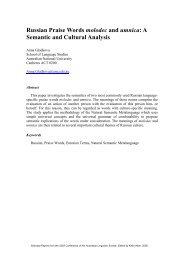ALS 2010 Annual Conference Programme - Australian Linguistic ...
ALS 2010 Annual Conference Programme - Australian Linguistic ...
ALS 2010 Annual Conference Programme - Australian Linguistic ...
You also want an ePaper? Increase the reach of your titles
YUMPU automatically turns print PDFs into web optimized ePapers that Google loves.
Bin Towairesh<br />
Abdullah Bin Towairesh (King Saud University, The University of Queensland)<br />
abdullah.bintowairesh@uqconnect.edu.au<br />
My Father, I Am Your Father: The Use of Address Inversion in the city<br />
of Riyadh, Saudi Arabia<br />
Keywords: Address terms. Address inversion. Saudi Sociolinguistics.<br />
Address inversion involves addressing someone with a term that expresses the<br />
speaker’s role in a dyad rather than the addressee’s, e.g. a mother calling her<br />
child mama (mother), an uncle calling his nephew Qammo (uncle). The use of<br />
address inversion can be found in many languages around the world including<br />
Turkish, Bengali, French, Italian, Russian and Arabic (Braun 1988). This phenomenon<br />
has also been referred to in the literature by other names including “Reverse Role<br />
Vocatives” (Rieschild 1998) and “Bi-polar Address Terms” (Yassin 1977).<br />
This paper examines the use of address inversion in the city of Riyadh and documents<br />
the different structures and functions for this practice. The data on the<br />
use of address inversion in this region comes from questionnaires, focus groups,<br />
the analysis of a Saudi television show, and the observation of natural speech.<br />
The forms used for address inversion in Riyadh include: 1. Basic Kinship terms (KT),<br />
2. Child-talk kinship terms, 3. Kinship terms diminutives and 4. The “wa-ana-KT”<br />
compound.<br />
Speakers in Riyadh use these forms in different contexts that range from expressing<br />
affection and admonishing gently to giving instructions and parental advice. The<br />
choice between the basic kinship terms and the child-talk kinship terms is usually<br />
based on the age of the addressee. This distinction can bee seen in the following<br />
examples:<br />
(1) Hala Abu-i, . . . wayne alQial<br />
Hello my Father (son), . . . didn’t you bring your children?<br />
(a father, early sixties, to his son early thirties, greeting him when he came to<br />
visit)<br />
(2) xalas ya baba aÃles<br />
Ok baba (my son), set down<br />
(a father, late twenties, addressing his son. 5 years old, asking him to stop<br />
being rowdy and set down)<br />
The “wa-ana-KT” compound, however, is more likely used in the contexts of giving<br />
instructions, advice and warnings.



